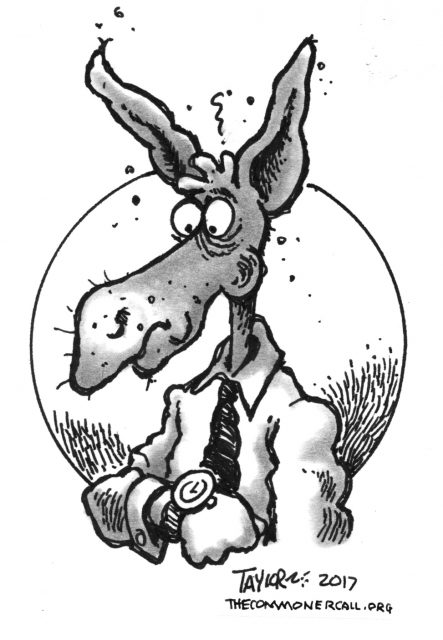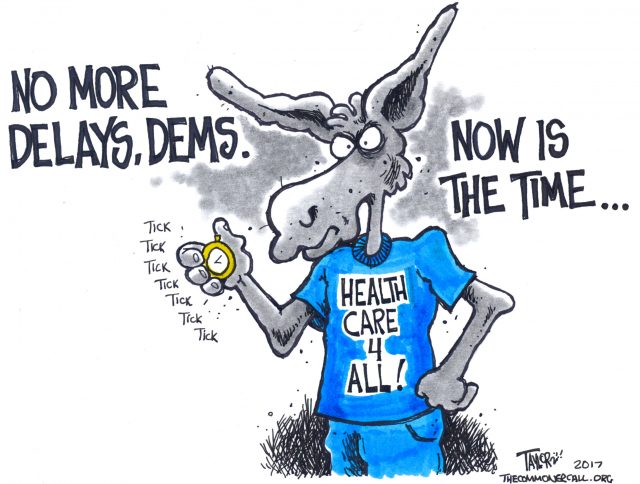
Time’s up, Dems!
By Jessica Corbett
Common Dreams (8/8/17)
As popular support for single-payer continues to grow and Sen. Bernie Sanders (I-Vt.) prepares to introduce Medicare for All legislation, the Establishment wing of the Democratic Party is reportedly “alarmed” by the shifting dynamics and fearful “of primary election challenges” if they don’t support Sanders’s proposal.
“Democrats who don’t get behind it could find themselves on the wrong side of the most energetic wing of the party,” Politico reported Monday.
Political organizers and supporters of Sanders are already speaking out about how lawmakers’ responses could impact upcoming elections.
“Any Democrat worth their salt that doesn’t unequivocally say Medicare for All is the way to go? To me, there’s something wrong with them,” Nina Turner, president of Our Revolution—the political group that formed out of Sanders’s presidential campaign—told Politico. “We’re not going to accept no more hemming and hawing. No more game playing. Make your stand.”
“It’s a litmus test. It’s a clarifying issue like none I’ve ever seen. We’re talking about people’s lives and health and money.” —RoseAnn DeMoro, National Nurses United
“Our view is that within the Democratic Party, this is fast-emerging as a litmus test,” Ben Tulchin, the pollster for Sanders’s presidential run, told Politico.
RoseAnn DeMoro, executive director of the Sanders-aligned National Nurses United union, agrees. “It’s a litmus test,” DeMoro told NBC News last month. “It’s a clarifying issue like none I’ve ever seen. We’re talking about people’s lives and health and money.”
Growing support
Mounting public support of a Medicare for All national healthcare system could sway centrist Democrats, and perhaps even Senate Republicans, who are up for reelection in 2018 or 2020.
A national poll released by Quinnipiac last week found that a majority of American voters overall, and 67 percent of Democrats, believe that replacing the nation’s current healthcare system with a single-payer system—”in which the federal government would expand Medicare to cover the medical expenses of every American citizen”—is a good idea.

Growing support for related legislation in the House also suggests that Democratic senators could be pressured by public opinion to support Sen. Sanders’s proposal.
For more than a decade, Rep. John Conyers (D-Mich.) has consistently introduced House single-payer legislation, but his bill introduced earlier this year—”The Expanded And Improved Medicare For All Act” or H.R. 676 (pdf)—has received unprecedented support from House Democrats, with more than 100 of them signing on as co-sponsors.
Rep. Keith Ellison (D-Minn.), deputy chair of the Democratic National Committee, acknowledged how impactful a candidate’s position on the Medicare for All issue can be on Congressional races in a May interview with the Huffington Post.

Although Rep. Ellison emphasized that the DNC won’t tell candidates which positions to take on any issues, he also said: “I recommend that you win your election, and I think a good way to do it is to support the Conyers bill.”
Looking toward the 2020 presidential race, Rep. Conyers told NBC News: “I don’t know how many of the candidates will support Medicare for All…. But it’s pretty obvious at this point that the winning one will.”
Despite the efforts of lawmakers like Sen. Sanders and Rep. Conyers, as well as growing public support of Medicare for All, many establishment Democrats within and beyond Congress remain apprehensive about supporting it.
“In the name of political reality, some liberal pundits, politicians and policy wonks are scolding progressives to give up on Medicare for All,” noted Michael Lightly, National Nurses United’s director of public policy, in a Common Dreams op-ed on Tuesday.
Citing Paul Krugman’s latest New York Times column warning against the push for Medicare for All, Lightly argues that “progressives are badly served” by such “shallow political advice,” which “obscures the reality working people actually face, and undermines the fight for our values and program.”
The program Lightly envisions aligns with the proposals of Sen. Sanders and Rep. Conyers: improving Medicare, and expanding it to all Americans, which, he writes, would establish a national system to “confront the industry, contain prices and restore the values of caring, compassion and community to our healthcare system.”
(This work is licensed under a Creative Commons Attribution-Share Alike 3.0 License.)
- Salon: The Case For Medicare For All — Plus 7 Smaller Steps To Fix U.S. Health Care – While we devote 18 percent of our GDP to healthcare, not only is the health of Americans no better than the health of the citizens of other wealthy nations, but by some measures, it’s markedly worse. Clearly then, we are not getting much bang from our healthcare buck. How much do administrative costs add to our national healthcare bill? Most estimates range from one-quarter to one-third of that bill—perhaps about $800 billion. We know that our high healthcare costs are due mainly to high administrative costs and to the overconsumption of medical care. If these two costs could be minimized, our healthcare costs would be cut almost in half. In sum, each year we waste close to $1.5 trillion in resources because of our grossly inefficient healthcare system. SOLUTIONS: Before we consider a comprehensive plan to make our healthcare system much more efficient, here are seven smaller steps we should take. … Read the Rest
- In These Times: The First Priority For The Resurgent U.S. Socialist Movement? Single-Payer Healthcare – “Are y’all ready to crush the private health insurance industry? Are you ready to make healthcare a human right in America?” These questions from Ari Marcantonio, a single-payer organizer for the East Bay chapter of the Democratic Socialists of America (DSA), were met with raucous cheers at the organization’s national convention in Chicago this weekend. DSA members affirmed their commitment to making single-payer organizing a national priority with a majority vote by the convention’s more than 700 delegates. Billed as the largest gathering of U.S. socialists since World War II, the convention took place on the heels of DSA reaching more than 25,000 dues-paying members—an all-time high (this author is a member of the group). … Read the Rest

